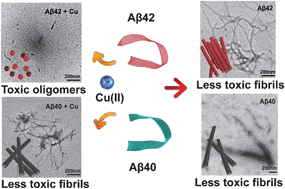Copper has been identified as a critical factor in Alzheimer’s disease due to its involvement in amyloid-β (Aβ) related toxicity, although the mechanism for this has not been understood.
Now Yan-Mei Li and co-workers have shown that while copper does not affect Aβ40, it significantly affects the aggregation Aβ42, enhancing the cytotoxicity of this protein. Aβ42 forms strong interactions with the copper causing it to change conformation to form highly toxic Aβ42 oligomers.
Stopping these Aβ42–copper interactions could therefore provide a promising therapy for Alzheimer’s disease.
Read this HOT Nanoscale article in full:
Copper inducing Aβ42 rather than Aβ40 nanoscale oligomer formation is the key process for Aβ neurotoxicity
Lu Jin, Wei-Hui Wu, Qiu-Ye Li, Yu-Fen Zhao and Yan-Mei Li
Nanoscale, 2011
DOI: 10.1039/C1NR11029B











